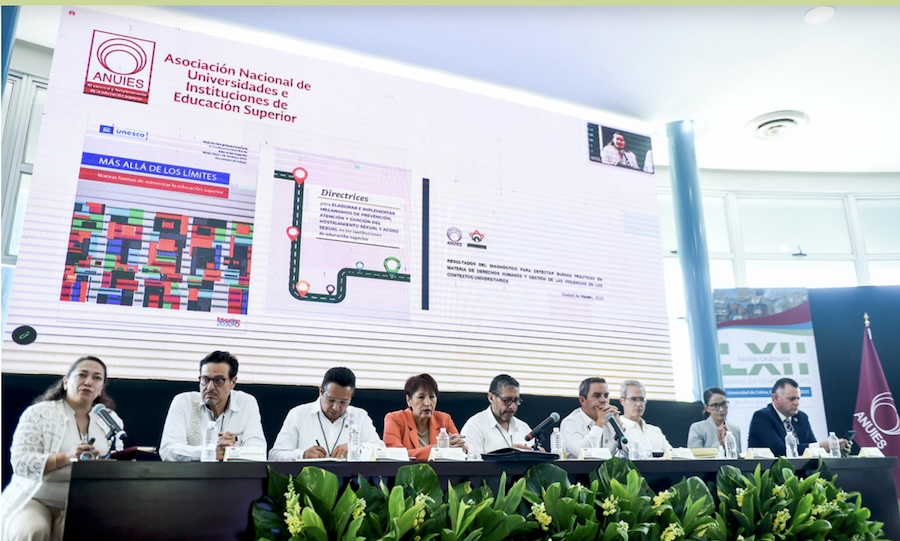… EDUCATION FOR PEACE …
An article from the Universidad de Colima
Last weekend (June 13), 113 rectors of universities and public and private institutions in the country ratified the strategy for building a culture of peace in Higher Education Institutions (IES), during the LXII Ordinary General Assembly of the National Association of Universities and Higher Education Institutions (ANUIES), which was held in person at the University of Colima.

With a broad agenda of national educational issues, the rectors also ratified the creation of the National Network for Peace and the National Network of Higher Education for Inclusion. The general director of Academic Strengthening of ANUIES, Luis Alberto Fierro Ramírez explained that these are the path towards the construction of the university that Mexico needs.”
The person responsible for the Comprehensive Peace Building Program from the ANUIES Universities, Hortensia Sierra Hernández, prioritized the concepts of dignity, integrity and well-being as the values for actions for a culture of peace within educational communities.
Likewise, she said that the General Education Law is a mandate: “Many times we do not know where to start, but each community has actions that only need to weave together these three concepts.” Thus, she highlighted, “the culture of peace concerns human rights, equity, collaborative work, networks, gender perspective, equality, elimination of stereotypes, promotion and respect for the equality of women and men, mental health and eradication of any type of violence.”
(Article continued in right column)
Is there progress towards a culture of peace in Mexico?
(Article continued from left column)
For his part, Francisco Gorjón Gómez presented the National Network for Peace as a collaborative work scenario between institutions involving experts and actions in the culture of peace and including students and researchers to promote the international objectives defined by the the objectives of sustainable development of the United Nations.
He also spoke of establishing a peace and human rights laboratory, as well as generating projects that have an impact as a network. As a national initiatives of the ANUIES, it calls for support from all the rectors of the IES and the largest number of people and experts.
Likewise, Servando Gutiérrez Ramírez spoke about what will be the National Network of Higher Education for Inclusion. He said that the number of people in conditions of exclusion has increased “at the same time as conditions of vulnerability that impact the situation of people, not only with some disability but also those who are in vulnerable conditions such as indigenous people, Afro-descendants, people of sexual and gender diversity and older adults.”
He added that there is interest in collaborating in a national network and that a large number of public and private institutions already collaborate. All of them have people who are experts in inclusion and vulnerability issues. This, he continued, “will give important solidity and social meaning to this network, because as people with disabilities insist: ‘nothing about us without involving us.’”
Upon learning details of both networks, different rectors highlighted the current importance of the two themes, asking how to integrate them, if there was any financing, and requesting that they not be bureaucratized.
In this regard, the general director of University and Intercultural Higher Education, Carmen Rodríguez Armenta, indicated, via virtual presentation, that within the federal and state resource ministries and as part of the 2023 financial plan, “there is the idea of presenting a protocol about sexual harassment and an institutional program on a culture of peace.”
She continued, “It is now an obligation of the General Law of Higher Education and also a commitment of the resource that are needed.” She added that the auditors of the Higher Body of the Federation in 2024 will have this document duly formalized by their general university council.
Finally, she recalled the importance of the session convened by ANUIES, with its protocol to eradicate gender violence and with the institutional peace program authorized by its university councils.